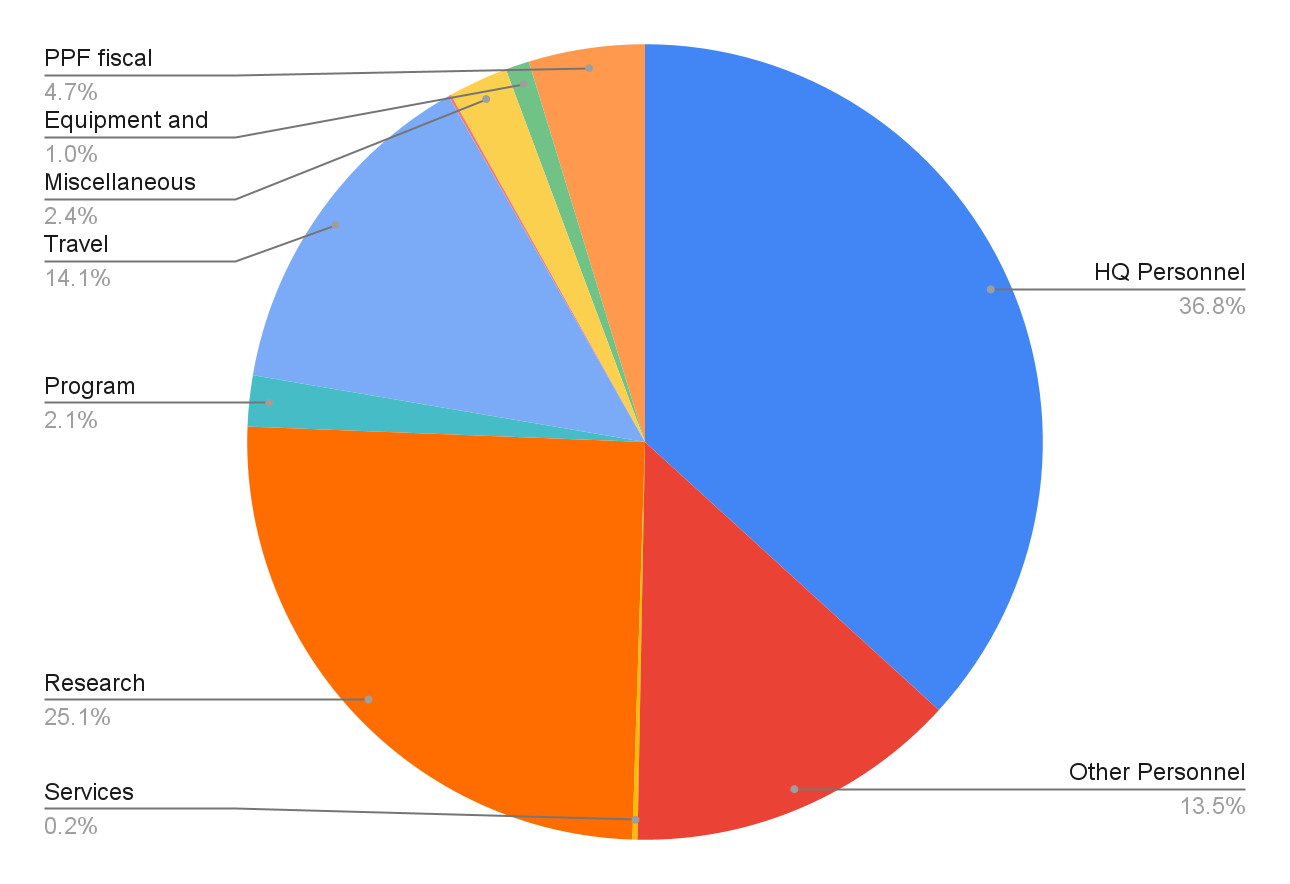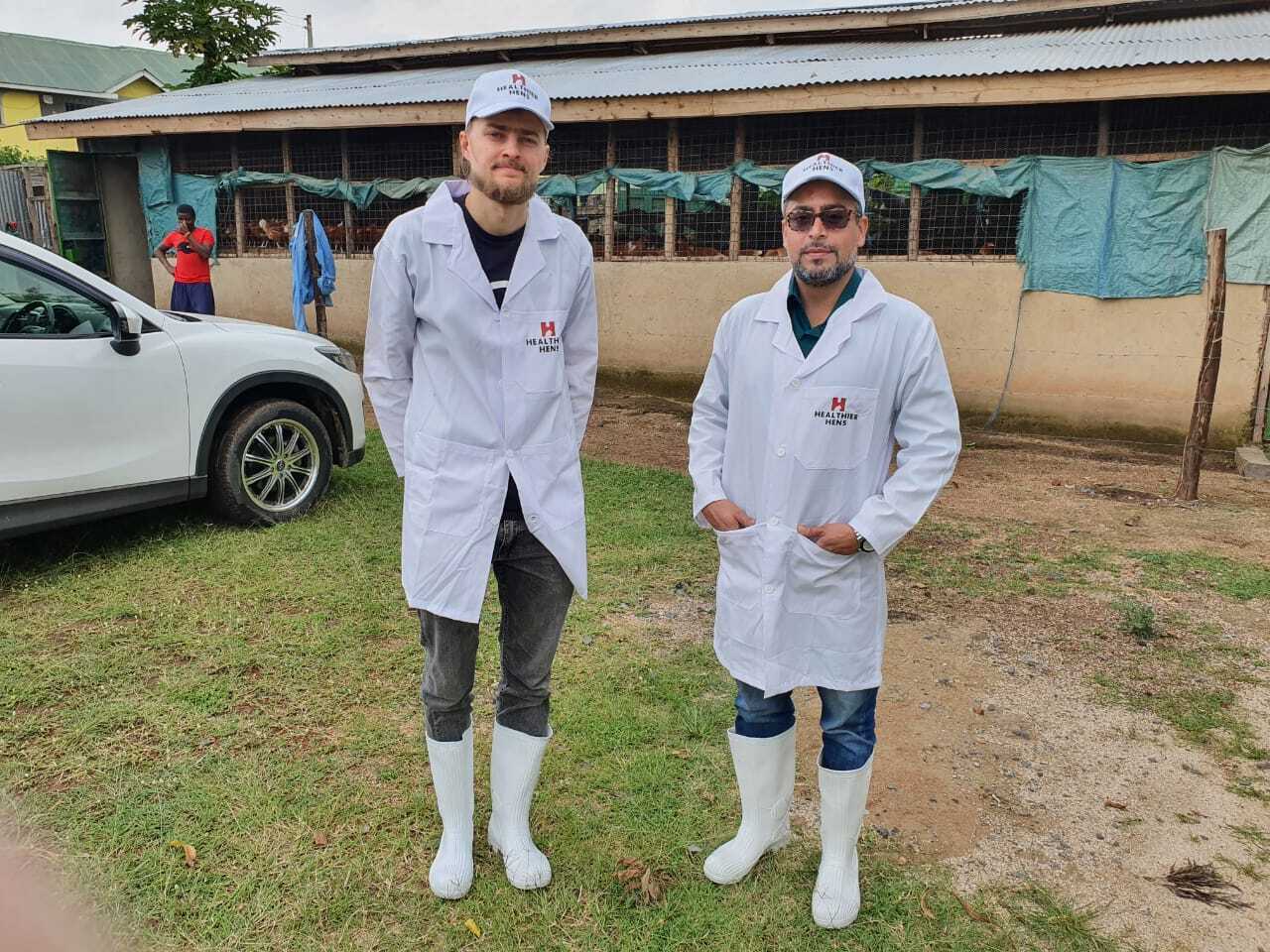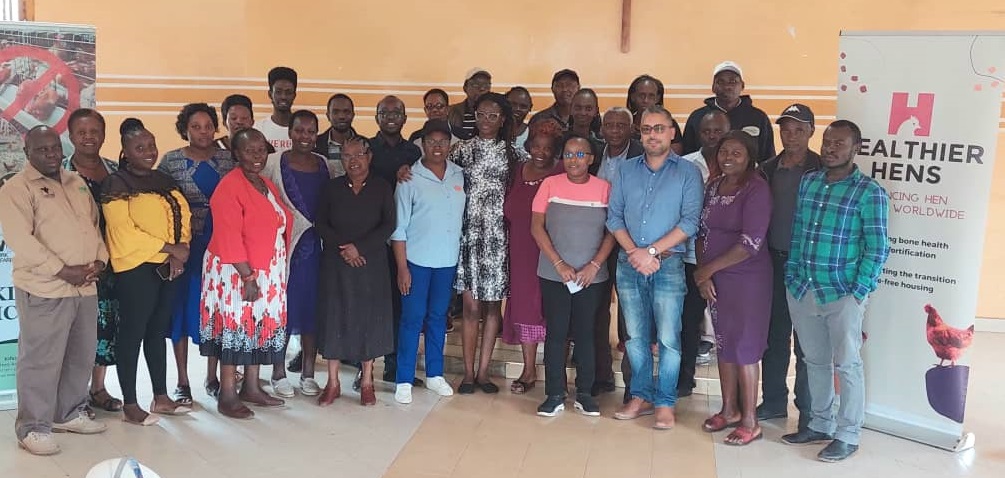Healthier Hens Y1 update including challenges so far and a call for funding
By lukasj10🔸, Isaac_Esparza @ 2022-10-18T16:41 (+57)
Key points
- Our mission and approach remain largely unchanged
- Our organisational capacity is growing
- We spent most of our Y1 budget on staff, research and travel
- We have made slight, pilot country-informed adjustments to our strategy
- We will ramp up our program work in Y2
- We are finding it rather difficult to fundraise, Y2 budget ($230k) is still not fully covered
Healthier Hens (HH) received funding from Charity Entrepreneurship, EA Funds and individual donors until now. We need more funding to keep investigating promising dietary interventions to improve the welfare of cage-free hens and engaging cage-free egg farming stakeholders to adopt these interventions. You can donate here.
Our mission and approach
Keel bone fractures are the second biggest source of hens’ suffering after behavioral deprivation related to cages, and the biggest in cage-free systems. Our mission is to reduce suffering of hens addressing this biggest source of pain. Numerous studies have shown that dietary interventions reduce bone fractures. Our goal is to ensure that hens have adequate nutrition and experience less pain. We are doing that by outreach and advocacy targeted at d cage-free egg farming stakeholders (including farmers, feed mills and regulators) to implement these interventions. Please read our introductory and 6M update posts to learn more about the background of HH.
Capacity, staff and organizational growth
We used Y1 to grow in capacity. The corresponding activities involved setting up an advisory board – including African farmed animal welfare (FAW) movement, animal welfare and keel bone damage experts – joining an international FAW association focused on egg-laying hen welfare, visiting egg farms and feed producers in Kenya, and running initial animal welfare workshops. This has permitted us to be well aware of ongoing cage-free campaigns and existing hen welfare interventions, learn what practical obstacles the industry faces, and what knowledge/capacity gaps must be addressed to facilitate our program work in improving hen welfare.
After choosing our pilot country of operations, our main task was to hire a full-time Country Manager to facilitate our efforts on the ground. Our team has also seen two Research Interns joining our efforts to build knowledge capacity on how hen nutrition relates to welfare issues we are seeing on farms. Looking forward, we will recruit Data Collection and Operation Interns in Kenya, remote Research Interns and a hen welfare/nutrition specialist during Y2, which should bring the total of paid HH staff up to 8.
We had a total operational budget of $159k for Y1. Its break-down can be seen below. The majority of our funds were used for Co-founder and staff salaries, research (feed trial in Switzerland) and travel expenses (mainly related to, initially, country scoping and on-the-ground Kenya activities). Y2 will see more of our budget accounting for non Co-founder staff expenses and program expenses. The total estimated Y2 budget is currently at $230k, with $50k raised so far.

Strategic updates
Our country selection process took a significant part of Y1 to carry out (read more about it here). We are building up knowledge and networks within the local cage-free egg production and feed manufacturing industries via co-founder country visits and the work led by our Country Manager. The need to build reputation and establish actively connected networks within the different communities became apparent as a necessity to initiate pilot work. This is why we are ramping up the farmer training portion of our work while the other research activities are ongoing. The workshops will act as one of the first steps in enabling us to advance towards positive impact for the hens:
- Identify and recruit cage-free farmers for our pilot program work
- Pilot proves the problem and effectiveness of the solution and is used to create outreach materials
- Advocacy is carried out more effectively
- Practices are being changed and implemented
- Reduction in bone fractures is achieved
- Hens experience less suffering
If anything, our strategy has been updated even more towards making use of collaboration as seen by our partnership with the University of Bern, where a promising scalable dietary intervention will be assessed in terms of effect size, cost effectiveness and flow-through effects. We are also actively engaging other FAW NGOs and seeking opportunities to learn and contribute.
Pilot operations
The first six months on the ground has enabled us to uncover several key challenges/opportunities. Below is a quick list of some of the highlights:
- There was a raw ingredient crisis in the country brought on and exacerbated by COVID, poor local crop yields and the war in Ukraine. This is potentially solved now by the lift of GMO ingredient import ban, which will reduce market tension and prices.
- The newly elected president owns one of the largest caged hen farms in the country. However, he is advocating strongly for the needs of farmers (e.g. the streamlining of the GMO import ban lift), which we intend to make use of by leveraging the farmers’ needs for high-quality feeds.
- Many millers were hesitant to engage in new product development given the problematic raw material market. The incoming GMO imports should ease business. We will use farmer data gathered at farm visits and welfare workshops as an incentive for the millers to try a new product.
- Farmers are really hard pressed by increasing feed prices and often resort to switching to cheaper feed or mixing in alternative ingredients. The improving market dynamics and farmer-friendly government should alleviate this, allowing us to make a stronger case for the need to improve feed quality in the region.
- Feed intake rates are significantly higher in Kenya, rendering our initial estimates off. However, after making corresponding adjustments to the optimal key nutrient levels in the feed, we’re still finding significant feed quality issues among commercial feed samples (at time of publication: 27%, 35%, 35% and 46% of the tested feeds were deficient in calcium, phosphorous, vitamin D3 and protein, respectively). The regional standards, on the other hand, are not as far off as initially evaluated for hens kept cage-free. The same cannot be said, unfortunately, for regulatory enforcement - we have updated our assessment as more pessimistic.
Through ongoing farmer visits and a series of tailored hen welfare workshops, we are able to better understand how the farmers’ desire to obtain higher quality feeds and eagerness to acquire farm management practices can be effectively leveraged to showcase demand for changes in how feed quality is regulated and ensured in the country.


Funding opportunities
HH struggled to diversify its funding sources during Y1. Below are several concerns that were raised by potential funders, we provide our thinking behind the topics below and invite further discussion on what role exploratory FAW work such as ours should play.
- Our approach is too short termist: Feed fortification as a way to decrease bone fractures is well studied. We plan to first implement that on a smaller scale to provide proof-of-concept of real-life implementation, and once sufficient adoption has been developed, advocate for increasing mandatory requirements for feed leading to long-lasting impact. Out of the three complementary approaches to addressing the widespread keel bone fracture issue (feed, housing/management and genetics) feed offers the most flexible and quick avenue to impact. We are still confident that it is an angle worth investigating and that the potential reductions in the incidence of fractures could be significant (current expectation: 5-20%). However, we do remain open to the possibility that once more information about the feasibility of improving genetics will be available, we will advocate for that as well.
- Our intervention is too risky: there are risks of our work impeding that of groups working on cage-free corporate outreach work and potentially leading to a net improvement of farming economics. We are taking mitigating measures to reduce these risks, i.e. choosing to target cage-free production instead of caged not to have double ask, being in close contact and collaboration with cage-free FAW NGOs and limiting the exposure of our intervention via controlled feed trials where we can also evaluate the effects on egg productivity. Additionally better feed is going to be more costly and therefore over the long term, reduce profitability.
- We do not approach the issue at a large enough scale: we have two pillars of operation: pilot on-the-ground work and research. While the former includes a limited amount of select collaborators (see main reasoning above), the latter includes a significant amount of resources into quantifying the cost-efficacy of an intervention geared specifically at large-scale farms, akin to those most prevalent in the Global North. Once proof of concept is established, our goals are to tackle the issue at scale, be it via regulation and enforcement or/and working at factory farm level, respectively.
HH’s most urgent funding need is operational funds, which would help us avoid slowing down, and reduce the amount of co-founder work dedicated to fundraising and potentially enabling the project to continue. We would like to raise a further $180k for Y2 operations (of $230k total budget) to sustain and continue our work without slowing down. These figures are updated as we continue working on the ground in our pilot country of operations and keep identifying promising alternative interventions to allocate research resources to. This accounts for $20k operational expenses per month. Our growth plan is also being updated and can be continuously monitored and discussed via our 5 year plan.
You can make your contribution here. We currently accept all major credit cards. If donating a large sum, please contact us at info@healthierhens.com to initiate a bank transfer. If you have questions about donation opportunities, please email or book a meeting with our Head of Logistics.
Staying up to date
To stay in the loop with what we’re up to, consider subscribing to our newsletter. Please get in touch if you’d like to comment, challenge our work or to suggest something in person. Thank you!
! Additional info and clarifications were added to the text on the 21st of October, 2022!
Charles He @ 2022-10-18T19:51 (+3)
Some really strong talent in this org, whatever they do, I hope it's very impactful and well funded.
lukasj10 @ 2022-10-22T09:40 (+1)
Thanks for your support, Charles! Y2 should really give us more insight into what's possible.